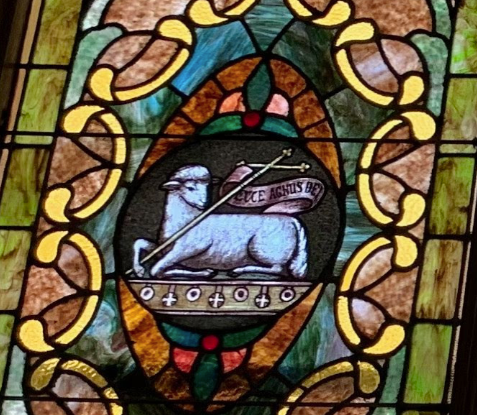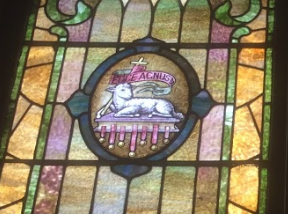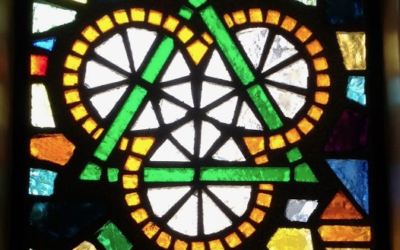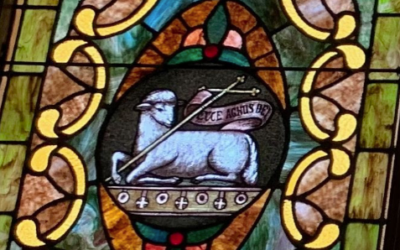Lord, to whom shall we go?
Sunday, August 22, 2021
Watch the service

Read the sermon
Turn and Serve
The good ol’ days. Many years ago, when I was a new pastor, I had a preaching service at a local assisted living center. And quite often the elderly people would speak of the “good ol’ days.’” With these yearning, pining words they would long for those days. And I remember how, after one of those days when the people would speak about the good ol’ days, after the preaching service, I went to the room of one of the members of my church to give him communion. And he shook his head, saying that the good ol’ days weren’t really that good. And then, for long minutes, he told me stories of what it was like when he was young—how the conditions and the people weren’t nearly as good as the other people chose to remember it. There is, built in us, especially if we aren’t content where we are right now, to make the people of the past better than they were. In God’s word this morning, we see an example of this. In these words Joshua is old. And he will soon die. And he is preaching to them a farewell sermon. This is what he tells his people: “1 Then Joshua assembled all the tribes of Israel at Shechem. He summoned the elders, leaders, judges and officials of Israel, and they presented themselves before God. 2 Joshua said to all the people, “This is what the Lord, the God of Israel, says: ‘Long ago your ancestors, including Terah the father of Abraham and Nahor, lived beyond the Euphrates River and worshiped other gods. 3 But I took your father Abraham from the land beyond the Euphrates and led him throughout Canaan and gave him many descendants. I gave him Isaac,” (Josh. 24:1–3 NIV11-GKE)
Joshua starts his sermon with a massive attention-getter. He speaks to them about Father Abraham. To the Hebrews, Abraham was a massive figure. They traced their lineage back to him. And they all wanted to be like him. And what is the fact that Joshua shares about Abraham? Abraham worshipped other gods—as did his father, and his grand father. How hard that would have been for the people of Joshua’s day to hear. He’s letting them know that the good ol’ days of Father Abraham weren’t always that good. Abraham worshipped other gods. But what did the Lord do? He was kind to Abraham. Abraham didn’t have a clue who the Lord was. Joshua tells us that the Lord “took” him.1 The Lord, through his word, gave Abraham faith in him. Then what did the Lord do? He gave him.2 He gave him Isaac. And through Isaac he had the promise that there would be Savior for his sins. Joshua tells his people two important facts: First, Abraham worshipped other gods. Second, the Lord was kind to Abraham. Then, where does Joshua go in his sermon? “11 “ ‘Then you crossed the Jordan and came to Jericho. The citizens of Jericho fought against you, as did also the Amorites, Perizzites, Canaanites, Hittites, Girgashites, Hivites and Jebusites, but I gave them into your hands. 12 I sent the hornet ahead of you, which drove them out before you—also the two Amorite kings. You did not do it with your own sword and bow. 13 So I gave you a land on which you did not toil and cities you did not build; and you live in them and eat from vineyards and olive groves that you did not plant.’ 14 “Now fear the Lord and serve him with all faithfulness. Throw away the gods your ancestors worshiped beyond the Euphrates River and in Egypt, and serve the Lord. 15 But if serving the Lord seems undesirable to you, then choose for yourselves this day whom you will serve, whether the gods your ancestors served beyond the Euphrates, or the gods of the Amorites, in whose land you are living. But as for me and my household, we will serve the Lord.”” (Josh. 24:11–15 NIV11-GKE)
Notice what Joshua does here. He lets his people know that the situation in life for them was the same as it was for Abraham. Abraham had other gods. Joshua’s people had other gods. The Lord was kind to Abraham. So also, the Lord was kind to them. He puts in front of them two paths. But how he does it is punchy and fascinating. He lets them know that they have two paths in front of them. And they can only go down one of those paths. The first is choosing. They two bad choices. They can choose the useless idols that Abraham used to serve on the other side of the Euphrates river. Or they can serve the gods of the Canaanites where they were. Very punchy, very blunt. And then he goes from there in a very fascinating direction. He says, “fine, if you want to go in that direction, then go ahead, but here is what I and my family are going to do.” We will serve. Fascinating. We would have expected him to say, “choose.” Instead he says, “serve.”3 He lets them know so boldly and bluntly that they have their own gods they serve. And he urges them to follow the Lord because of the Lord’s kindness. What then is the reaction the people have to Joshua’s sermon? “16 Then the people answered, “Far be it from us to forsake the Lord to serve other gods! 17 It was the Lord our God himself who brought us and our parents up out of Egypt, from that land of slavery, and performed those great signs before our eyes. He protected us on our entire journey and among all the nations through which we traveled. 18 And the Lord drove out before us all the nations, including the Amorites, who lived in the land. We too will serve the Lord, because he is our God.”” (Josh. 24:16–18 NIV11-GKE)
These are some amazing words. First, the people make a list of all the amazing kind acts the Lord has done for them. Then, they get just as punchy—just as blunt as Joshua is. They say, “as for us, we too will serve the Lord.”4
My dear friends in Christ, these are some important words for us to think through this morning. Their gods followed them. The Lord brought Abraham to faith. And the Lord gave Abraham a tour of the land his descendants would dwell in. But the other gods came with him. Jacob and his family went down to Egypt. But the other gods followed. And here God’s people were, just about to go in and conquer the rest of the promised land, and look, the other gods followed them there.
This teaches us the ever-so-important fact that in the life of a believer there will always be other gods that follow us—always. Wherever you go, however old you get, you will always have gods that follow you. And what do I mean by “other gods?” I’m not talking about carvings of stone that you bow down and worship. No, I’m talking about desires of the heart that push our Lord off of that first place in our souls and hearts: Pride or despair, self-hate or self-worship; pretending that those in the past were better than they were and pretending that we who live now are better than they are. These and so many more are examples of our “other gods” that follow us. And what Joshua tells us today is the same as he tells them in those days: Turn. Every day we will have to get up in the morning and turn away from our very own gods. Every night we will have to do the same. Why? Because they follow us. And we can’t get rid of them. So, we carry on this striving and struggle every day. We turn away.
But notice what the life of a Christian also looks like. We don’t just turn. We also serve. Notice that it’s not enough to somehow acknowledge the other gods in our lives and hate them. We can’t just turn from them. We also need to turn to a person and place that is healthy. We serve the Lord. And in these words we hear three times why we serve our Lord. He is kind. He was kind to Abraham. He was kind to Joshua. He was kind to the Hebrews. And, my dear friends, he is kind to us. The Lord was kind to Abraham. In his kindness he gave Abraham Isaac. And through Isaac eventually Jesus was born. And Jesus paid for our sins. He paid for these “other gods” that keep following us, and sadly, we love to pick up and cherish. The Lord was kind to his people. Time and time again, these other gods would follow the Lord’s people. And, time and time again, as they repented, the Lord forgave them and allowed them to serve him.
And my dear friends, these words speak so much and so clearly to us today. Every Christian is a failure. We have our gods. They follow us. And we cherish them. And just like the people in the Old Testament, we want either to pretend that our forefathers didn’t have these sick and sinful desires or that we don’t have them now. But we do. They are our “other gods.” And we have to admit that we are failures. They keep following us. And we keep picking them up. Where and when is the time and place where we are able to throw them behind us forever? The answer is very clear in God’s word: either when Jesus comes on Judgment Day or when you die. Until then, what Joshua says is what your life looks like: turning and serving.
That is shocking and sad news, when you think about it. But my friends, it is also wonderful news. Because, if you, like me hate the fact that your other gods follow you wherever you go, then this shows that the Holy Spirit is there in you, working in you and working for you. If, like me, you yearn for forgiveness now, and an end to these other gods someday, then, like Joshua, let us say, “when it comes to me and my house, we will serve the Lord.” And let us always remember why we serve him. We serve him because of his kindness. He is the one who gave us life and breath. He is the one who day by day, forgives each of our sins. He is the one who gives us the wisdom to see how horrible our other gods are. He is the one, who by his Holy Spirit, give us the ability to say “no” to these other gods. So many kindnesses we could list here. And there are so many more we forget. Let us then every day turn away from our “other gods.” And every day, let us serve the Lord, always remembering why: his kindness. Amen.
1 ”וָ֠אֶקַּח“ (Josh. 24:3 HMT-W4)
2 ”וָֽאֶתֶּן“ (Josh. 24:3 HMT-W4)
3 ”נַעֲבֹ֖ד“ (Josh. 24:15 HMT-W4)
4 ”גַּם־אֲנַ֙חְנוּ֙ נַעֲבֹ֣ד“ (Josh. 24:18 BHS-T)



